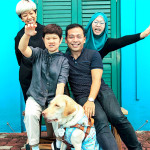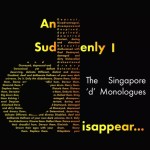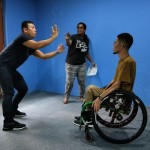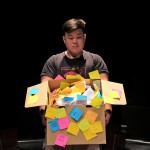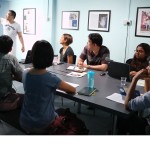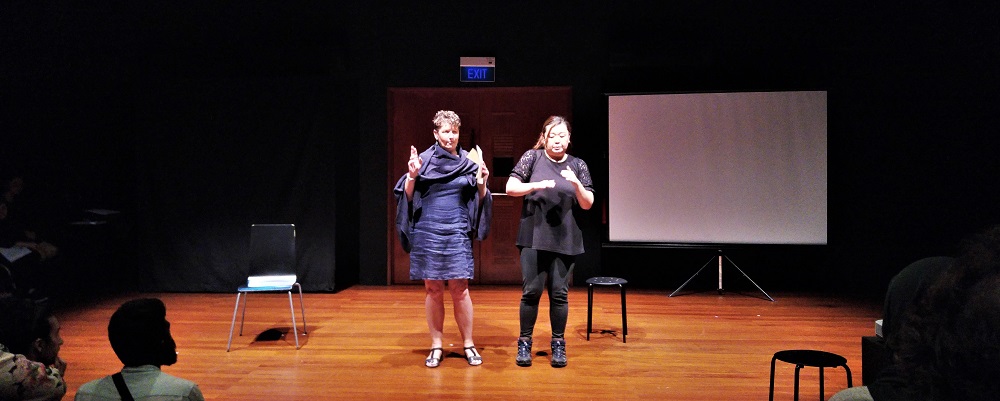
UK playwright Kaite O’Reilly (left) addressing the audience at “And Suddenly I Disappear… The Singapore ‘d’ Monologues”, with sign language interpreter Evelyn Chye (right) translating for Deaf members of the audiences. Photo: Gwen Pew
In a previous blog post, we introduced local theatre practitioner Peter Sau and the intercultural project that he’s working on with UK artists Kaite O’Reilly and Phillip Zarrilli. Titled The Singapore ‘d’ Monologues, it’s a work commissioned by a funding programme in the UK called Unlimited. At the time the last blog post was published in July, the UK and Singapore teams were in a long distance relationship, working over emails and phone calls.
Kaite, Phillip, and the rest of the UK team finally flew to Singapore in mid-September, and everyone spent two weeks holed up in Centre 42’s Rehearsal Studio going through an intense developmental process. The resulting piece is titled And Suddenly I Disappear… The Singapore ‘d’ Monologues, and the script is written by Kaite based on over 40 interviews the Singapore team conducted with people with disability. A closed-door work-in-progress sharing took place in our Black Box from 29 September to 1 October 2017, and was warmly received by those who attended.
The future of the work is uncertain, as the team will need to secure further funding in order to develop it into a full production, but the team is nonetheless very proud of what they have achieved so far. We will be sharing more video documentation of both the process and the piece itself in due time, but for now, we ask Kaite to tell us a bit about herself and her work.
Why did you start working with Deaf and disabled artists?
I identify as disabled and most of my friends are disabled or Deaf. They are extraordinarily creative and inventive in their work and the processes they use in performance, and I wanted to collaborate within disability arts and culture, as well as the so-called ‘mainstream’.
Why do you feel that it’s important to have a conversation about “difference, disability, and what it is to be human” through The Singapore ‘d’ Monologues, as you wrote in your blog? And why now?
In the UK owing to the Conservative government and their policies we are going backwards regarding disability rights and provisions, yet the rest of the world is increasingly interested in notions of inclusivity and diversity. The UK has many decades of experience regarding disability and inclusivity – perhaps through the dialogue we can inspire each other, explore notions of difference in broad as well as individual contexts, explore what it is to be human, and learn from each other.
You say in your blog that you knew you wanted to collaborate with both Peter Sau and Ramesh Meyyappan since you met them in 2004. Why?
They are both outstanding artists who are remarkably talented and innovative, with excellent reputations. They have only grown in experience and skill in the years since I first met them and I am excited and honoured to have the opportunity of making this artistic experiment with them.
Why did you decide to partner with artists in Singapore for this project, as opposed to other countries?
The relationships are already in place. I have been following Ramesh Meyyappan’s work since he moved to the UK – I’ve attended his workshops and performances at disability and Deaf arts festivals in the UK and Vienna. We have developed a freindship and knowledge of each others’ work and it will be fascinating to see how we might collaborate. Why Singapore? I have an on-going relationship with Singapore owing to my involved with ITI (Intercultural Theatre Institute, formerly TTRP) where I have been teaching dramaturgy as a visiting artist for some years. Also, the director Phillip Zarrilli and I have a very strong relationship with Peter Sau, based on previous training, workshops and productions. I have also been supporting Peter in his introduction to the UK’s disability arts and culture. He has such passion and integrity and a desire to make a real difference in professionalising disability arts and Deaf arts in Singapore, and supporting inclusivity. I admire his energy and integrity and so a collaboration with him, building on already well-established connections and relationships we both have seems a fruitful path to follow.
What are some of the challenges that you’ve faced in working with disabled artists?
The main challenges have been inaccessible buildings and narrow attitudes and preconceptions towards people with difference.
Why do you prefer fictionalised monologues over verbatim theatre?
I have a problem with verbatim theatre, especially when there is a playwright’s name attached to the project. I see peoples’ stories as belonging to them and so taking these stories can be a form of ‘theft’. Of course this isn’t always the case – Ping Chong’s Undesireable Elements series in New York is a fantastic counter example. He makes interesting work with the stories of real people – but he then has these people perform their own stories, even though they are not actors. That is appropriate for his intentions and the work he does, often revolving around social inclusion or social justice – and the stories are still owned by the tellers, the people who lived them.
I prefer fiction as sometimes that is the way to tell a better truth. I have also found if the stories reveal social injustice, a verbatim audience will often try and let themselves off the hook by saying ‘oh well, that was just one person – just her story, too bad.’ When we are working with fiction inspired by a whole series of interviews, a positive or negative aspect cannot be reduced to just one individual’s experience, rather, it might reflect collective experience and be applicable to society as a whole.
I also want to work with fiction, as that gives me as a playwright a more interesting job – I can work across different theatre styles, form, and aesthetics rather than being restrained by the naturalism of verbatim. Also, Verbatim theatre does not lend itself to the visual and physical theatre styles that my Deaf collaborators Ramesh Meyyappan and UK-based performer Sophie Stone utilises. Verbatim offers quite a narrow range in theatrical styles and possibilities – whereas when we are working with fiction, we can be more imaginative in our creation of characters, stories, events, and have more ways of telling these theatrically.
On your website you say that you have been “developing alternative dramaturgies informed by a Deaf and disability perspective” since 2003. Can you elaborate a bit about what you mean by that?
By ‘alternative’, I mean to the mainstream culture and by ‘alternative dramaturgies’ I mean the dramaturgical innovations in process, aesthetic, narrative, content and form developed by Deaf and disabled dancers, theatre and live art practitioners. Telling different stories, with different protagonists, challenging or subverting the sadly overwhelmingly negative representation of difference and disability in our global media and particularly in the western theatrical canon. It involves ‘the aesthetics of access’ – a creative use of ‘access tools’ such as sign language interpretation or visual language, captioning and audio description in the body of the work rather than an ‘add on’. My disability perspective is political and cultural, based on embracing all the possibilities of human variety and seeing us all as equal. Unfortunately in many contexts disabled and Deaf people are treated as second class citizens, reliant on charity. My perspective is informed by the Social model of disability, which sees disability as a social construct, rather than the medical model, where the body is ‘at fault’, requiring medicalisation and ‘fixing’. It is society and its barriers – physical and attitudinal – which disable me, not my impairments.
What do you hope to achieve with The Singapore ‘d’ Monologues?
Good theatre that subverts negative representations of disability and difference, excellent performances that surpass expectations, raise questions and challenge the narrow confines of ‘normalcy’. Theatre is the study of what it is to be human. Let’s broaden our perspectives and embrace all the possibilities of human variety.
Interview by Gwen Pew on 8 June 2017
Published on 30 September 2017
A closed-door work-in-progress sharing of And Suddenly I Disappear… The Singapore ‘d’ Monologues took place at Centre 42 from 29 September – 1 October 2017.

